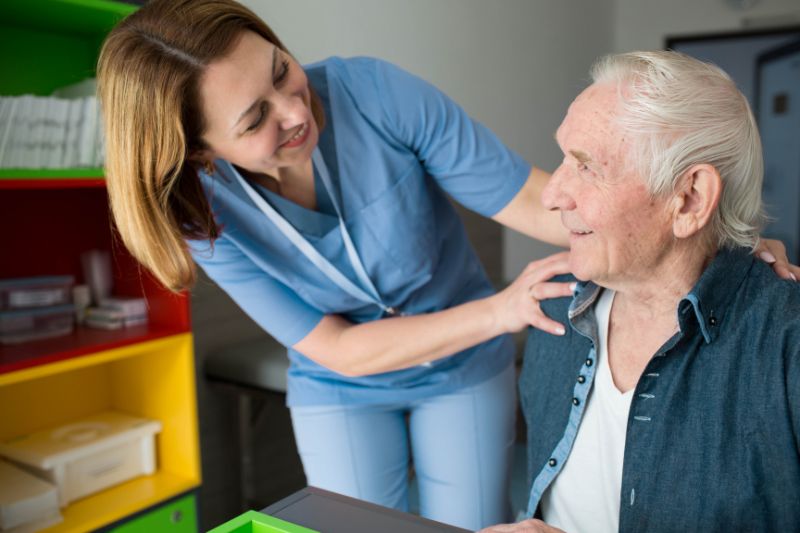Orthopedic surgery can take its toll, but you or your loved one - with the right approach - can make your recovery more seamless and get back to living your best lives. There’s no doubting that rehab is always daunting at first. But with support, empathy, and a commitment to your sustained recovery, happiness and healthiness are closer than you think.
You’ve likely undergone the procedure at a reputable surgery clinic such as Springfield Clinic Orthopedics or the Orthopedic Center of Illinois. Meaning you or your loved one are already on the path to an optimal recovery. Sure-handed surgeons across the Springfield community get their patients off to the best possible start to their rehab at The Bridge Care Suites.
Follow these orthopedic after surgery dos and don’ts for the best chance of recovery:
Avoid These 5 Don’ts
1) Stay Out of Your Car
No, this suggestion isn’t because of anesthesia-though that’s a good reason not to drive. Pain meds are not to be trifled with. But staying out of any vehicle is absolutely critical to your recovery after orthopedic surgery. The awkward movements and overall stress can make rehab take much longer than you need to. You’ll either aggravate the injury or reopen the wound.
2) No Lifting Allowed
Bending over and picking anything up after surgery could possibly worsen an injury. Beyond that, you must be wary of your wounds because it’s possible to reopen them. This could also lead to infection. It’s best to treat yourself as gently as possible after your procedure.
3) Avoid Cigarettes
Smoking is always unadvisable. But that notion rings doubly true after surgery. Research from the Copenhagen Wound Healing Center shows that smoking prevents oxygen from reaching the wound. It also hinders inflammatory cell function, slowing down the healing process. The studies referenced above indicate that smoking adds several weeks to wound recovery. Plus, it causes an increased chance for post-op infections and pneumonia.
4) Don’t Forget Appointments
Remember that you need your staples and sutures removed even as you start to feel better. And doctors need to check the wound and evaluate your condition.
5) Limit Demanding Exercise
You or your loved one might lead an active and robust life. After all, the more you move, the younger you feel. But your after-surgery activities are the exception to the above rule. Even if it was a minor procedure and you’re feeling better, you should avoid anything too strenuous.
Follow These 7 To-Do’s
1) Listen to Your Doctor (and Your Rehab Team)
Your doctor and - potentially - your skilled nursing care team at Bridge Care Suites are experts in crafting orthopedic surgery recovery plans. Some suggestions you hear might sound like inconveniences or plainly not make sense to you. Still, medical professionals know what’s best for getting you up on your feet.
By disregarding suggestions from a trained healthcare expert, you’ll find yourself stuck with a longer recovery process.
2) Follow Your Pain Medication Regimen
Surgeons will give you the suggested pain medication regime, which needs to be followed every step of the way. Generally, orthopedic surgery patients will receive a regional nerve block that wears off after anywhere between 6 to 18 hours. Staying on schedule with prescribed medications will decrease your pain levels when the nerve block wears off.
Avoid motions that cause pain. And of course, as mentioned earlier, stay out of any vehicles. Moreover, don’t sign any legal documents either. The only things you should be focused on after surgery are icing yourself and elevating the body part that underwent the procedure. This way, you’ll reduce pain and swelling.
3) Take Your Prescribed Amount of Antibiotics
Post-surgery patients find themselves at risk of post-op infections. By sticking to the suggested doses of antibiotics, you’ll mitigate the risk of every last potential problem you can run into. One issue that arises with some patients is stopping their antibiotics early. This mistake can cause antibiotic resistance-which will hamper any antibiotic treatments after your recovery.
4) Keep an Eye on Potential Infections
Here are issues to watch for that might be a sign of infection right after your orthopedic surgery:
- Puss from the wound
- Excessive bleeding from the wound
- Fever
- Constant pain
- Increased swelling/redness
- If a new odor starts coming from the wound
Provided these symptoms exist, you should get in touch with your nearest medical health professional.
5) Commit to Physical Therapy
You (or your loved one) will likely require physical therapy after surgery. Don’t miss out on your appointments. These will be a pivotal component of returning to your former mobility and quality of life. Home exercise plans should be followed when you aren’t visiting your therapist. You’ll receive the support needed to ensure you don’t miss out on your exercises at the Bridge Care Suites. You’ll have an entire expert medical team helping you through this process during your short-term stay.
6) Get Your Solids and Fluids
You might not be overly interested in food or drinks for a few days after your orthopedic procedure. And while you won’t be eager to force down a salad or guzzle water, keeping yourself nourished after surgery improves the healing process. Most importantly, eating and drinking will offset many common complications and stave off any unpleasant anesthesia side effects.
7) Make Sure to Move (Within Reason)
Depending on what your doctor suggests is advisable, being in motion ensures the smoothness of your recovery. Of course, if you had limitations before the surgery (or after), keep those in mind. But going for short walks every couple of hours will bring you the following benefits:
- Prevent severe complications (e.g., deep vein thrombosis (DVT) and pneumonia)
- Offset any constipation (this often happens after procedures because of inactivity and reactions to pain medication)
- Return you back to normal activities
Following these dos and don’ts, and you’ll be good as new before you know it.
Even the most straightforward orthopedic procedure requires you to follow the appropriate post-surgery plan. Sticking to our suggestions will help you get back to your previous quality of life. And you’ll further improve your rehab by putting your trust in The Bridge Care Suites team.
Feel free to contact us with any questions to best plan your recovery.





